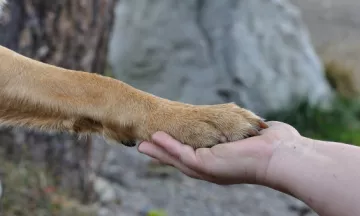Do dogs get depression?
Believe it or not, dogs can experience depression just like us humans. Dog depression can have a negative impact on a dog’s overall health and quality of life. Therefore, it’s important for owners to know what to look out for and what to do if you suspect your dog has a persistent low mood. In doing so, you will be able to take steps to help your dog.

Why do dogs get depression?
Dogs can feel blue for many reasons, though it is often caused by a change in routine or environment.
Dogs are social animals that thrive in a stable home environment. As such, the loss of a loved one (whether human or pet) can impact a dog’s mental state. Dogs may also appear depressed after the school holidays, or after a lockdown when normal life resumes. This change can be confusing and stressful for a dog, who doesn’t understand why they are suddenly left alone. Left untreated, this can often lead to separation anxiety.
It’s important for dogs to have mental stimulation every day. As such, boredom from lack of activity can also lead to a dog feeling blue. A dog might have a low mood when they are sick or injured. Consequently, this might carry over to their recovery period, or immediately following surgery.
Lastly, a dog may experience a low mood because of an environmental change, such as moving house. For example, it can be stressful for a dog if their owner suddenly has to work longer hours and they are left alone during the day. Likewise, a dog might become blue if its owner leaves them to board with a pet sitter for the first time.

What are the signs of dog depression?
A depressed dog will display particular behaviours that dog owners should familiarise themselves with. It’s important to know what these signs are so that you can step in and address them.
Signs that a dog may be feeling depressed include:
- Low energy or disinterested behaviour
- Less interest in playing, walks or toys
- A pattern of eating much more or less than normal
- Excessive licking or chewing
- A change in sleep pattern
- Anxious behaviours such as pacing or chewing
- Destructive or aggressive behaviour
- Withdrawal or hiding for no reason
How can I help my dog if it seems sad?
It's best to visit the vet if your dog shows a sudden change in behaviour and seems to be depressed. There may be an underlying reason for the change that can be quickly and easily fixed. For example, hiring a dog sitter can be a simple fix if your dog is lonely and bored throughout the day.

Your dog sitter can give your dog the mental and physical stimulation it needs to get back on track. However, your dog may also have an unknown medical condition that needs addressing. This is why a vet is always the best first point of contact.






